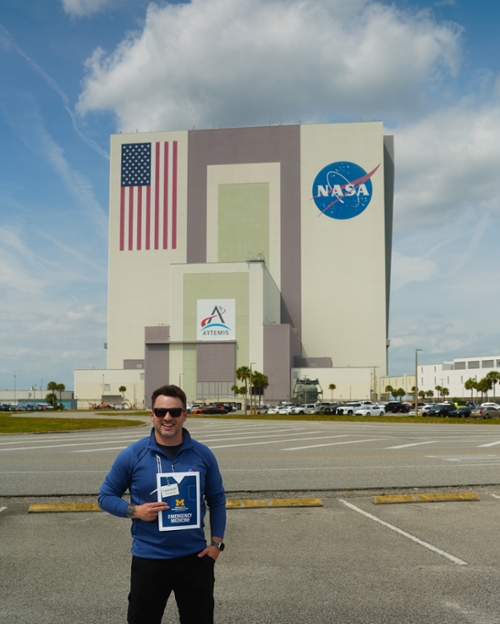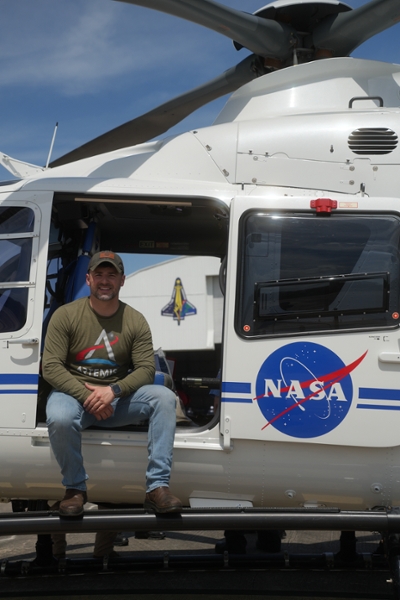
Lincoln Memorial University-DeBusk College of Osteopathic Medicine (LMU-DCOM) student doctor Jacob Dalton is on an extraordinary path as he nears the final stages of his medical education. He has recently been involved in two groundbreaking clinical rotations in aerospace medicine at NASA’s Kennedy Space Center and Johnson Space Center. Drawing on his experience as a U.S. Navy veteran, Dalton is charting a course for a future in aerospace medicine and is eager to launch his career after residency.
Dalton’s journey to LMU-DCOM is a testament to his perseverance and determination that reflects his unwavering dedication to medicine. His path began in the Navy, where he served as a Navy corpsman and Fleet Marine Force aerospace medical technician. While working with flight surgeons at Camp Lejeune, he discovered his passion for medicine. The osteopathic physicians he served alongside left a lasting impression that inspired him to pursue a career in osteopathic medicine.
“My flight surgeons were the ones who encouraged me to go back to school and become a physician,” Dalton recalled. “I finished my service and was honorably discharged in 2017, then studied Spanish, chemistry, and history at Kennesaw State University. I knew LMU was the school for me after my interview with Drs. Chesnut and Freeman. Seeing how DOs regularly hold critical positions as flight surgeons, physicians to the president, and even the current chief medical officer of NASA, I felt osteopathic medicine was the right path to take my nontraditional background and turn it into a unique career with plenty of opportunities for growth.”
Dalton steadily worked his way through his early years of medical school, and his persistence paid off when he applied for NASA’s aerospace medicine clerkships. It was an opportunity he knew could set him apart in his chosen field. He was accepted for two rotations: one at Kennedy Space Center in Florida and another at Johnson Space Center in Texas, which he is currently completing.
“The funny part is, I almost didn’t apply because I felt I wasn’t good enough,” Dalton said. “A demonstrated and genuine interest in aerospace medicine is more important to them than any single academic qualification. My co-interns come from everywhere—from LMU to Harvard. They’re as young as 25 and as old as 65—civilians and service members, students, residents, and triple-boarded attendings. They specialize in everything from emergency medicine and OB-GYN to neurology and family medicine. Apply, follow up, and be persistent.”
During his rotation at Kennedy Space Center, Dalton gained hands-on experience working closely with NASA physicians and aerospace physiologists. Half of his time was spent in the Biomedical Engineering and Research Laboratory collaborating with an aerospace physiologist. The other half was spent in a clinic, working alongside a NASA physician board-certified in both emergency and aerospace medicine.
“I was responsible for producing a self-selected research presentation and attending lectures. Any free time in our schedules was filled with tours of the various health-related services at Kennedy Space Center, such as industrial hygiene, environmental services, life support systems, and NASA Fire & Rescue,” Dalton explained. “It’s a small clerkship with an intimate feel. It was recently revived after being paused at the end of the Space Shuttle program in 2011.”
For his independent research project, Dalton focused on cryogenic technology and adapting NASA’s Advanced Cryogenic Breathing Apparatus (ACryoBA) for use in woodland firefighting. He credits his time with the Cumberland Gap Volunteer Fire Department while at LMU-DCOM as invaluable for this research, further demonstrating how his background and diverse experiences have come full circle.
However, Dalton’s journey nearly took a different turn when he and LMU-DCOM faculty and staff faced a time crunch securing an affiliation agreement with Kennedy Space Center for the rotation. In what seemed like fate, the agreement was finalized just days before the rotation was set to begin, making the opportunity even more meaningful for Dalton.
“This rotation was instrumental to my career since I hope to work in aerospace medicine after residency,” he said.
Dalton is now in the midst of his second rotation at NASA’s Johnson Space Center in Texas. This rotation was entirely voluntary. He chose to take it on during what would otherwise be his off time between Match and the start of his residency. Johnson Space Center is providing him with even more insight into the field, including opportunities to attend lectures, work with astronauts, and gain exposure to human performance testing in space medicine.
“This rotation has been incredible,” Dalton said. “I’m still in my first week, so I’m looking forward to all the knowledge I’ll gain in the coming weeks.”
Dalton’s enthusiasm for aerospace medicine is only matched by his commitment to becoming the most well-rounded physician he can be. After completing his rotations and graduating, he will begin his residency in emergency medicine at the University of Michigan Health-West. He remains focused on his goal of becoming a NASA flight surgeon, a dream that has grown stronger with each step of his medical journey.

Recalling a visit to the Shuttle Landing Facility—where the remains of the space shuttle Columbia were brought after it broke apart upon reentry in 2003—Dalton reflected on a moment that has stayed with him throughout his journey.
“Laurel B. Clark was a Navy flight surgeon who died on that mission. Her portrait hangs in the Naval Aerospace Medicine Institute, where she studied to be a Navy flight surgeon and I to be an aerospace medicine technician. That portrait has stuck with me throughout the years on this journey in life,” he said.
Dalton credits LMU-DCOM with helping him achieve this opportunity.
“This wouldn’t have been possible without the support of LMU faculty and staff, including Dr. Anya Cope, Dr. Michael Wieting, Mrs. Jennifer Schaeffer, and many others. I credit my Navy flight surgeons for giving me that initial spark and becoming my lifelong mentors,” he said. “LMU-DCOM gave me the latitude to tailor my elective experiences to help me achieve my dreams. The faculty was only ever a phone call away, and they supported me at every turn.”
Dalton’s story is one of persistence, passion, and a dedication to forging a nontraditional path in medicine—all while staying grounded in his desire to help others and explore the unique intersections of space and health care. He leaves fellow students with some advice drawn from his own experiences.
“There are innumerable valuable lessons I’ve learned here, but the biggest one is simply this: full send. When an opportunity presents itself, take full advantage. Apply, shake hands, network, surround yourself with people smarter than you, and get your hands on as much good training as possible because you’ll be a better physician for it at the end of the day,” he said. “Believe you can do this. It doesn’t take someone with a perfect academic record or extensive research experience. It takes someone interested and motivated enough to clinch the opportunity and make the most of it once they’re there. Find the opportunities, apply, ask your faculty for mentorship, and be persistent.”
The DeBusk College of Osteopathic Medicine is located on the campus of Lincoln Memorial University in Harrogate, Tennessee, at LMU-Knoxville in Knoxville, Tennessee, and at LMU-DCOM in Orange Park, Florida. LMU-DCOM is an integral part of LMU’s values-based learning community and is dedicated to preparing the next generation of osteopathic physicians to provide health care in the often-underserved region of Appalachia and beyond. For more information about LMU-DCOM, call 1.800.325.0900, ext. 7082, email dcom@LMUnet.edu, or visit us online at http://med.LMUnet.edu.